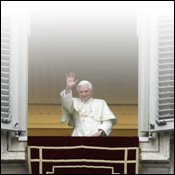
Eric Scheske
I saw two stories last week. Perhaps you can tell me what they have in common.
From St. Peter’s Square:
- Pope Benedict warned on Sunday against rampant materialism which he said was polluting the spirit of Christmas.
“In today’s consumer society, this time of the year unfortunately suffers from a sort of commercial ‘pollution’ that threatens to alter its real spirit,” the pope told a large crowd gathered in St. Peter’s Square to hear his weekly Angelus blessing.
- Joel Krupnik and his wife, Mildred Castellanos [have a] gory display [that] features a Santa with a knife in one hand and a severed head oozing blood from its eyes in the other.
In front of the Santa is a bare Christmas tree adorned with the severed heads and bloody bodies of Barbie dolls.
The couple, who live in a $3 million brownstone on East 18th Street, say they put up the outrageous display to protest the commercialization of Christmas.
The Krupniks’ concerns are driven by hate.
I don’t know that for certain, of course. The Krupniks might just have a sick sense of humor, but it’s safe to say the gory Santa display itself has more hate than love in it.
I see a lot of hate this time of year among those who disdain the commercialization of Christmas. That’s one reason why the commercialization lamentations have grown tiresome.
Don’t get me wrong, Pope Benedict’s concerns are apt. Christmas is too commercialized and poisoned with materialism.
But a lot of hateful dogs have been yelping about the commercialization, and the entire genre of complaint has taken on a curmudgeon-like quality that has more in common with the Grinch than concern for the purity of Christmas.
It’s not unusual, of course. Every opinion is motivated by love or hate. The two stances might seem identical, but they couldn’t be more opposite.
When it comes to the commercialization of Christmas, it’s hard not to condemn the crass materialism and commercialization that is a mockery of the poverty-stricken and simple birth in the manager.
But the condemnation must come with love, not hate.
Do we spitefully avoid the parties? Groan around our children, so they feel like their budding excitement is a burden? Complain so others can hear, thereby dulling their good feelings? In short, when we condemn, do we reject? If so, we have more in common with the Krupniks, who not only condemn and reject, but also spit on the holy day.
Or do we condemn like Pope Benedict, the man who in a few days will speak to the assembled at St. Peter’s about the birth of the Christ Child, exhorting them to live joyously in the knowledge that their Savior has been born?
He will, incidentally, speak from ornate surroundings, gold and art more expensive than most of us could possibly afford. Some people find this ironic, if not hypocritical. “The pope,” they say, “wants us to be less materialistic, but he wears a majestic robe and speaks from a balcony of gold.”
It is ironic, of course, but it’s not hypocritical. In fact, it’s fitting. The pope speaks from a balcony of gold, and thereby subjugates the highest material thing (gold) to the service of the spiritual things.
It is, quite frankly, what Christmas and all its commercialization calls for: subjugating material things — the parties, the gifts, the food — to a celebration of the highest thing: the Incarnation of God among us.
If we keep that in mind, the commercialization of Christmas can never get us down too much.
- © Copyright 2005 Catholic Exchange
Eric Scheske is an attorney, the Editor of The Daily Eudemon, a Contributing Editor of Godspy, and the former editor of Gilbert Magazine.

No comments:
Post a Comment